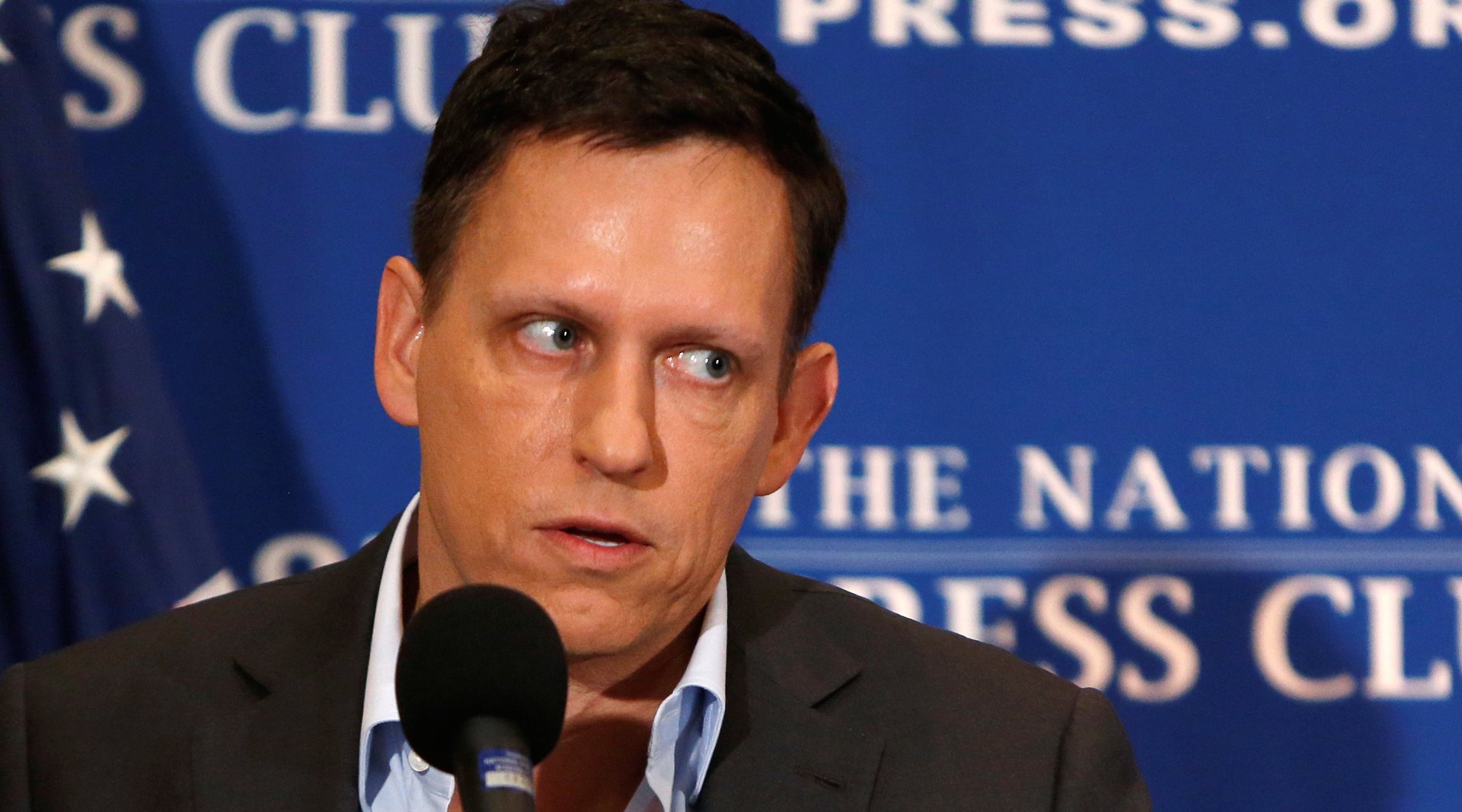Peter Thiel wants America to take Trump seriously, but not literally. That’s dangerous.
Perhaps more than any candidate in the history of the presidency, Donald Trump is prone to saying horrible things. He calls Mexicans rapists. He mocks disabled reporters and boasts about sexually harassing women. His supporters, from Paul Ryan on down, are thus faced with a difficulty. How do you endorse Donald Trump without endorsing all the terrible things he says?


Perhaps more than any candidate in the history of the presidency, Donald Trump is prone to saying horrible things. He calls Mexicans rapists. He mocks disabled reporters and boasts about sexually harassing women. His supporters, from Paul Ryan on down, are thus faced with a difficulty. How do you endorse Donald Trump without endorsing all the terrible things he says?
Billionaire venture capitalist Peter Thiel has come up with an innovative approach. Riffing off a phrase put forward by Salena Zito at the Atlantic, Thiel told the National Press Club on Monday morning that “the media is always taking [Trump] literally. I think a lot of the voters take him seriously but not literally.” He went on to argue that when Trump supporters “hear the Muslim comment or the wall comment, it’s not, ‘Are you going to build a wall like the Great Wall of China but, ‘We’re going to have a saner, more sensible immigration policy’ and ‘How do we strike the right balance between costs and benefits?’”
There are two problems with this “seriously but not literally” formulation. First, it suggests that Trump voters are fundamentally different than other voters, which they are not. And second, it underplays the importance of Trump’s lies, which are central to Trump’s de facto fascism.
Plenty of Trump voters do not pay close attention to policy details—Trump’s own national policy adviser and campaign co-chair called them boring back in September. But that’s also true of Clinton voters, and of all voters. Polls regularly show that a solid majority of voters are ignorant about most policy issues. As political scientist Jonathan Bernstein explains, “most people don’t base their votes on information they get about candidates and their policies.” Instead, they vote based on party identification, or based on identity—whether that means they identify with white communities, with black communities, with liberals, or with conservatives.
Most people who support Trump don’t care how high his proposed wall with Mexico will be, any more than most Clinton voters care about the details of her pathway to citizenship plan. Instead, Trump voters care that he is projecting antipathy to immigrants and Clinton’s care that she is projecting inclusion. In both cases, voters don’t take the positions literally. The idea that Trump supporters are some sort of anthropological curiosity is false; in their grasp of policy, they’re much like other voters. It’s Trump, not his supporters, which make his candidacy unusual.
In most cares, candidates try to provide policy substance, not just for voters (many of whom don’t care about the details) but for the press and interest groups. Under normal circumstances, these various experts help vet candidates on particular issues, notifying their constituents and followers about who is preferable and who isn’t. (See, for example, Vox writer Dylan Matthews’ piece analyzing Clinton’s poverty proposals.) Literalness, then, is almost never for the public as a whole. It’s a way to be accountable to the groups that fund, organize, and direct the agendas of political parties. Those groups are sometimes vilified as “special interests,” but their engagement, focus, and energy—not to mention their interest in the literal—is vital for the functioning of democracy.
Trump, though, doesn’t do literal. His policy proposals are mostly gibberish, and, in any case, they change day-to-day depending on his audience, his priorities, or the phase of the moon. First he wants to ban all Muslims, then he wants to let in only people “who share our values,” then he says he’s really talking about something called “extreme vetting.” Symbolically (or if you prefer, “seriously”) all of these proposals just mean, I don’t trust immigrants, and I’ll keep them away from America. Literally, though, the proposals mean nothing. Accountable to no one, Trump has left the factual behind. His candidacy is composed entirely of symbols. He is engaged in an aestheticization of politics—which is German philosopher Walter Benjamin’s thumbnail definition of fascism.
For Benjamin, the fascist dictator treats politics as an art form. Heroic fantasies of unified struggle against shadowy adversaries replace debates about legislative, economic, or social reform. When a politician is freed from the literal, he is also freed from the constraints of accountability. Absolute power means the fascist leader can literally do anything, and still be taken seriously., Trump lies all the time, in part because for his candidacy expertise and truth are unimportant; the only thing that matters are his words, because he’s the one saying them.
The fact that Trump is held to no literal accountability may well be part of what makes him attractive to Thiel as a candidate. In a 2009 address at the Cato Institute, Thiel declared, “I no longer believe that freedom and democracy are compatible.” He concluded, “The fate of our world may depend on the effort of a single person who builds or propagates the machinery of freedom that makes the world safe for capitalism.”
For people who want a single ruler, without the checks and balances of democracy, the lack of policy details is appealing in itself. Without the accountability of specific proposals, the leader is unconstrained by policy, decency, or even logic. The public in general doesn’t need to know policy details for democracy to function. But a democracy that has no regard for literal truth won’t be a democracy for long. That’s a reason to take Trump’s candidacy even more seriously, perhaps, than Thiel is willing to do.